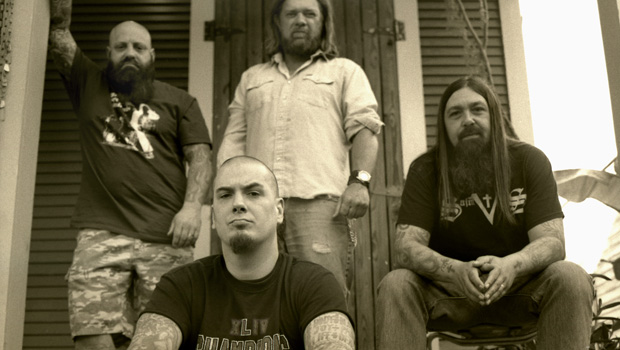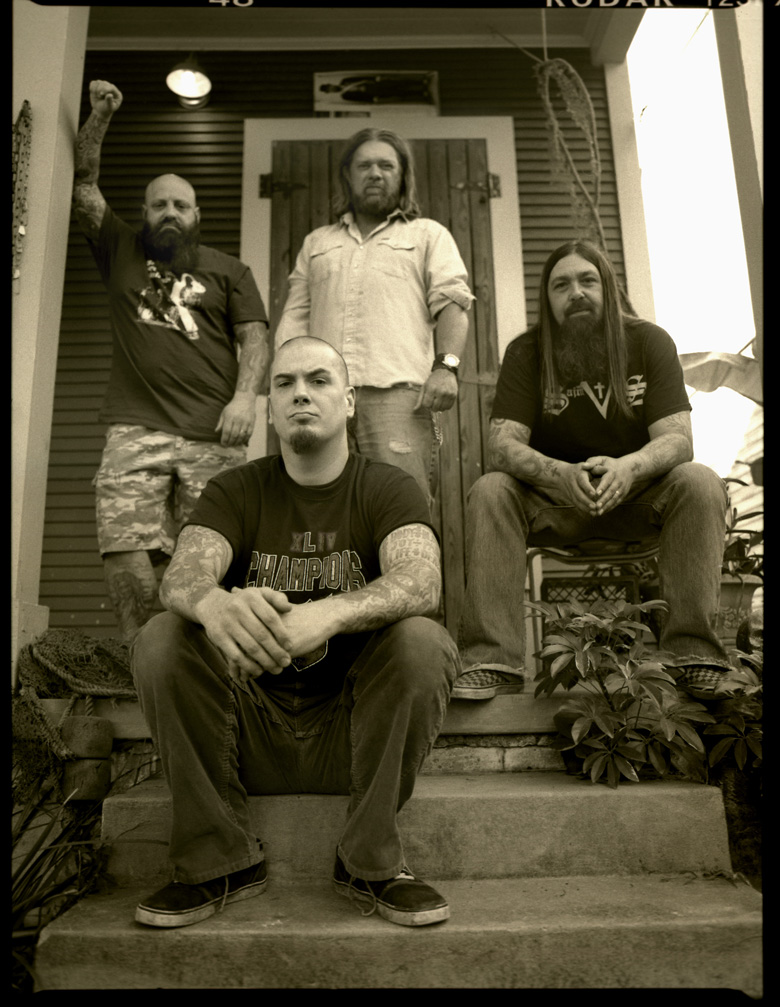Interview: Getting Down with Pepper Keenan and Kirk Windstein

Over the course of 20 years and thousands of touring miles, the relationships that make up Down — vocalist Philip Anselmo, drummer Jimmy Bower, bassist Pat Bruders and guitarists Pepper Keenan and Kirk Windstein — have outlasted most marriages.
“Tell me about it!” Windstein laughs. “I’ve been divorced twice! But you’re absolutely right — it’s like I’ve got four wives who happen to be guys.”
Windstein and his betrothed spend most of their lives on the road, as they all have musical projects outside of Down. For Windstein, there’s Kingdom of Sorrow and Crowbar. For Keenan, it’s Corrosion of Conformity. Right now, both men are focused on Down’s current stretch of U.S. dates, a November leg through South America, and in the midst of this, a series of four EPs in the works, each showcasing a different musical side to the band, but all connected as the sum of the parts.
It’s a chance to explore the many directions and influences that create Down, as well as a sharp move to remain in tandem with an industry in flux, where digital songs outsell physical CDs and six-song EPs stand a better chance than a 12-song disc.
Keenan and Windstein phoned in from Texas to talk about what it takes to get down with Down.
How does the rest of the band factor into the riffs and melodies that you both come up with?
Keenan: Sometimes I try and write overly simple riffs or chord structures so that Kirk can have room to breathe and not be so structured by a technical riff. I think sometimes writing those riffs is a lot trickier than writing complicated, busy riffs, where you’re filling in all the negative spaces. So I tend to think like that, in terms of the “classic song structure; you’ve heard it before” kind of deal. Kirk will come up with things, and sometimes we’ll do variations on the same riff with Jimmy changing the drumbeat. That’s a pretty big Down trick too, where we hammer a riff into the ground and Jimmy does half time.
Get The Pick Newsletter
All the latest guitar news, interviews, lessons, reviews, deals and more, direct to your inbox!
Windstein: I bring in riffs, but it’s very seldom that anyone’s riff is not tricked up a little bit by the other guy. Phil is in charge of arranging the songs. As far as me writing with Pepper, a lot of times I have a riff and he says, “Why don’t you do this,” or he has a riff and I do all the harmonies. The thing we have is weird; it works great, but we’re two completely different schools as far as guitar players and styles. We couldn’t be more different from one another, but when we work together, it’s magic. Certain things he does really well and certain things I do really well, but we understand one another and where we’re both coming from as players because we’ve played together so long. The very incarnation of this thing was 1991, so it’s been, like, 20 years.
We’ve done quite a bit of touring all over the world and quite a bit of writing, so it works out great. It’s like a symbiotic relationship in a way. It’s totally different, but we gel, we feed off of one another’s ideas, as do the other guys in the band. Everyone in the band plays guitar and writes riffs. In a lot of bands, one guy is the chief songwriter, but we get in there, throw around ideas, and if something clicks, we know it. Everybody puts their two cents in and we have what we think is a great final product.
What do the guitar parts and solos need to do within this band?
Keenan: When I play guitar with Down, I don’t have to sing, so it allows me to do more complicated things that I might not do with C.O.C. That’s the main difference. Sometimes there are pretty technical things going on when Phil’s singing, so that’s a different way to look at it.
Windstein: I think we’re a throwback in a lot of ways, and one of the ways is, sure, we’re all about the riff, but we’re also about the songs, like, we all love the Beatles. We’re trying to keep alive something that in my opinion seems to have gone away, which is concentrating on not just being heavy or loud or the fastest kick drum you can play or the craziest arpeggio you can do or whatever.
We’re trying to keep the spirit of the 1960s and 1970s and early 1980s rock and metal alive, which was really based around great songs. We’re proud of the music we make because we feel we are keeping that sprit alive and flying the flag for the old-school bands that it seems like the newer generation of bands unfortunately haven’t had the chance to experience.
What is the key to working successfully with another guitarist? It’s easier said than done for some players.
Keenan: Kirk and I love the same type of music. We see things easily, we know who’s got to do what solo and who’s got to do what riff by just the way the riff is or the way the solo is. If we need a fast, articulate solo, it’s going to be Kirk. If you need some David Gilmour melodic thing, it’s me. If you need the Michael Schenker shit, it aint gonna be me! We know it and we like it like that. We play to each other’s positive parts. It’s not like we sit there and practice all different kinds of music. I work on my strengths and Kirk works on his. And between those two, we’ve pretty much got it covered.
Windstein: Right, and I think a lot of times it has to do with egos — one thing Pepper and I don’t have a problem with that a lot of guitar players do. We want to write great songs, have big riffs and make music that’s like a throwback, but we don’t have the egos. Some guys are so stuck on the solo that everything to them besides the solo is boring. They’re just waiting for their solo. We’re not those types of players.
He does a lot more of the melodic kind of trippy stuff, the David Gilmour kind of approach, where I’m more — and he’d be the first to say this — if we have any fast solos, I do those. He does the weird effects and bendy stuff. It’s just a different approach. I honestly couldn’t imagine being in a band without two guitar players. I just couldn’t. It seems to me that something’s missing. I like the approach.
For a metal band, you boys sure do have the funk!
Keenan: That comes from me! We have some pretty ham-fisted shit going on if we want to, and we’re not afraid to go backward and do that. That’s the fun thing. We’ll go back and beat an E chord to death all day long; I don’t give a shit. If a song is going a certain direction, I think a lot of bands try to control it to put their sound on it, whereas we just let the song go and take its course and try to push it as far as we can in the song’s direction. Another thing is that we’re from the South, so of course some of that slippery greasiness is part of our thing, it’s part of the New Orleans thing. That’s one of the main things about Down in terms of being a heavy band is that we’re more into the melodic.
Windstein: Oh, absolutely, and thank you! That’s very well put and I totally agree! To me, there’s one reason and that’s because we’re from New Orleans. We grew up on New Orleans music, which is funk and blues; it’s music you can shake your ass to. We play behind the beat a lot. In a band like Down, we would never dream of playing to a click track or anything like that. It’s all about being in the pocket. Jimmy is a great behind-the-beat drummer. That gives you funk. Funk is playing behind the beat. It’s got a groove. We can shift gears and go behind a groove. Live, it’s even slower than it is on record; we call it switching gears.
We like switching gears. It brings an element of funk and old school into it. We all credit that to the environment we grew up in, which was New Orleans, which was the music and booze and having a good time, and ever since we were kids you’d be at your grandma and grandpa’s crawfish boil on the weekend and you’d be hearing Dr. John and the Neville Brothers and the Meters and all these popular New Orleans bands. It’s instilled in you. We’re a product of the environment we grew up around. To me, New Orleans is the best music town in the world. The best drummers, the funkiest, badass drummers, are guys like Mean Willie Green, Russell Battiste and Stan Moore. They’re monster drummers. It’s New Orleans. There’s something in the water down there.
Down Gear Rundown:
KIRK WINDSTEIN:
GUITARS: One ESP Eclipse; two custom, single-pickup, double-cutaway ESPs.
AMPS: Two Orange Thunderverb 50 heads, four Orange 4X12 cabs with Celestion Vintage 30 speakers.
EFFECTS: Maxon Tube Screamer, Boss Super Chorus, Dunlop "Slash" Wah pedal, MXR Phase 90, Boss TU-12 tuner.
PEPPER KEENAN:
GUITARS: Two Gibson ES-335s and one Gibson Firebird for drop-tuning. All guitars totally stock.
AMPS: Two Orange Thunderverb 50 heads, four Orange 4X12 cabs with Celestion Vintage 30 speakers.
EFFECTS: Tuner, rack-mounted wah, MXR Phase 90, Ibanez Square Button Tube Screamer and the Electro-Harmonix Pog and thick-ass bass picks.
— Alison Richter
Alison Richter interviews artists, producers, engineers and other music industry professionals for print and online publications. Read more of her interviews right here.
Photo: Anna Hrnjak



Alison Richter is a seasoned journalist who interviews musicians, producers, engineers, and other industry professionals, and covers mental health issues for GuitarWorld.com. Writing credits include a wide range of publications, including GuitarWorld.com, MusicRadar.com, Bass Player, TNAG Connoisseur, Reverb, Music Industry News, Acoustic, Drummer, Guitar.com, Gearphoria, She Shreds, Guitar Girl, and Collectible Guitar.
“Even standing with the guitars is tricky”: Ritchie Blackmore's health sparks concern after update from wife and musical partner Candice Night
“The rest of the world didn't know that the world's greatest guitarist was playing a weekend gig at this place in Chelmsford”: The Aristocrats' Bryan Beller recalls the moment he met Guthrie Govan and formed a new kind of supergroup




![[from left] George Harrison with his Gretsch Country Gentleman, Norman Harris of Norman's Rare Guitars holds a gold-top Les Paul, John Fogerty with his legendary 1969 Rickenbacker](https://cdn.mos.cms.futurecdn.net/TuH3nuhn9etqjdn5sy4ntW.jpg)





